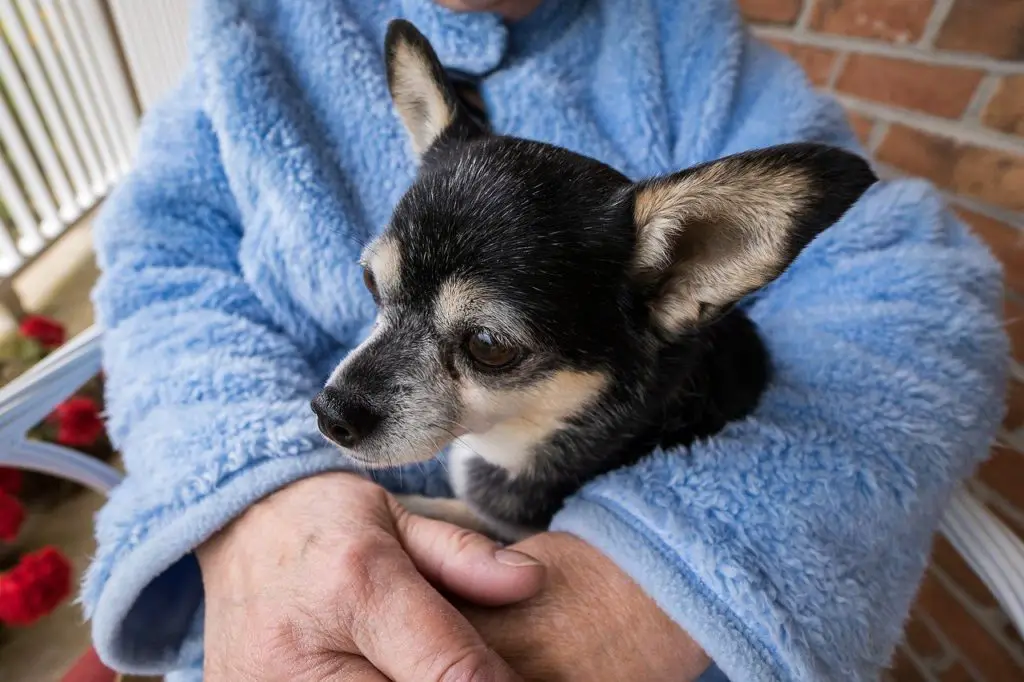I wondered how long do Chihuahuas live for while watching a documentary about the longest living dog breeds.
The name Bluey might be familiar to you in this regard. This Australian Cattle Dog lived up to the ripe old age of 29 years – something that is unheard of in dogs.
We all want our Chihuahuas to live long and healthy lives, don’t we? The good news is that this small, hardy dog breed can live between 12 and 18 years – which is significantly longer than most dog breeds.
In this guide, we will talk about a Chihuahua’s longevity, factors that affect it, and also common health issues in this small dog breed. We will also round up the guide with some tips that can help ensure that your Chihuahua lives longer and healthier.
How Long Do Chihuahuas Live For?

Chihuahuas live for nearly 12 to 18 years with the average lifespan of about 14 years.
The longest living Chihuahua was a cutie named Megabyte who lived up to 20 years! Naturally, there are no records of this available so if you find any, please be sure to drop us a line!
However, as loving Chihuahua owners, we can all seek hope in the fact that this small dog breed certainly has the potential to live for almost 2 decades – with proper care and attention of course.
In the next section, we will study the factors that decide how long do Chihuahuas live for.
What Factors Decide How Long Do Chihuahuas Live For?

Here are the factors that will tell how long do Chihuahuas live for:
1. Love and care it receives
How long a Chihuahua lives will depend upon the care given to it by a Chihuahua owner. As a responsible pet owner, you will naturally feed your Chi a healthy diet. This will go a long way in determining how long your Chihuahua lives for.
We recommend a healthy dog food like Royal Canin for Chihuahua which has precise protein and fiber content for optimum weight and digestion.
Along with good food, your Chi also needs daily exercise and mental stimulation. Without both, it is bound to get depressed and stressed out and that can significantly lower Chihuahua lifespan too.
2. Size
In general, smaller a Chihuahua, the longer it is likely to live.
Of course, this does not mean that you go searching for a teacup Chihuahua. You see, teacup Chihuahua is not even a recognized dog breed by the American Kennel Club. Breeders have just ‘made’ this designer dog breed smaller than normal Chihuahuas.
However, this type of breeding has resulted in a dog breed with many health issues. Therefore, you may want to steer clear of buying a teacup Chihuahua. Doing so is also unnecessarily encouraging shady breeders, puppy mills, and other unethical breeding practices.
3. Inbreeding vs. cross-breeding
It is no secret that inbred dogs live a lot less than cross-bred ones since the former acquires all the health issues of the related dogs. Therefore, a Chihuahua mix is more likely to live longer than a purebred Chihuahua. Of course, there can be exceptions in this too and it depends on the dogs used in the mix as well.
Why Do Most Chihuahuas Live Long?

The average lifespan of a Chihuahua is about 14 years. Thus, most Chihuahuas live longer-than-the average dog breeds – a fact that can be attributed to the following reasons:
1. Smaller dogs, longer lifespan
It is no surprise that the Chihuahuas live longer than most dog breeds because their small and diminutive sizes give them that advantage. Larger dog breeds like Great Danes are known to only have a life span of about 7 to 8 years. On the other hand, small dogs like Chihuahuas live nearly twice as long despite being less than half the size of this large dog breed.
2. They are generally hardy dogs
The Chihuahua originated in hot deserts of Mexico probably from wild dog breeds found in South America. Although the exact origins of the Chi are quite a mystery, it is no doubt that they are a hardy dog breed.
The ancestors of Chihuahuas were used to hardships and they lived in areas with extreme climates – typically, hot, arid, and dry.
This makes the Chi quite a rugged, hardy dog. Sure, they don’t react too well to the cold and get all shivery. Don’t be too surprised if you find your Chi searching for ways to get under covers! But despite this, it is still a hardy little dog.
3. Good genes and bloodlines
If you have purchased your Chihuahua dog from a reputed breeder, then you can rest assured that the dog’s bloodlines and genes are also good. Chances are you have also met the dam (mother) and father.
You can certainly get an idea how long your pet will live based on its parentage. Reputed breeders also avoid in-breeding as well as breeding dogs that have genetic issues. There are reliable genetic tests available these days that can show which dog is likely to develop which health issues.
This has greatly reduced the chances of breeding dogs prone to genetic health issues. That is why, the resulting Chihuahua puppies are also less likely to develop congenital issues and problems.
At What Age Do Most Chihuahuas Die?

Chihuahua breed is regularly classified by the Kennel club as one of the longest living dog breeds. The average lifespan of the Chi is between 12 and 18 years and most Chihuahuas die at the age of 14 to 16 years.
This means that Chis live nearly 4 to 5 years longer than average lifespan of dogs. For healthy Chis without any major health problems, it isn’t uncommon to live in the vicinity of almost 20 years.
As with any dog breed, we cannot generalize as to what age most Chihuahuas will die. With proper care and attention, you can expect your Chi to easily live up to 14 to 16 years, even longer.
What Do Chihuahuas Mostly Die From?

Most Chihuahuas tend to be healthy. This means that there is LOW risk but NOT NO-risk of some of the common health concerns they usually die from:
1. Heart problems
Heart problems are a major concern in purebred Chihuahuas. This includes patent ductus arteriosus and mitral valve disease. In both cases, the valves leading to the heart do not close properly. Resultantly, the blood accumulates around the dog’s heart causing immense strain on it.
Thankfully, early detection of heart problems like murmur can help your vet recommend the right medication. This can prolong your Chi’s lifespan considerably.
2. Bleeding disorders
A condition called hemophilia is also common in these smaller dogs. It causes abnormal bleeding after injury or surgery and can be fatal.
3. Porthosystemic shunt – liver issue
More Chihuahuas than other dog breeds are known to develop this condition known as PSS. If your companion dog has PSS, its liver cannot function properly. This causes toxins to build up in its system which can lead to seizures.
4. Neurological issues
Chihuahuas often suffer from seizures, epilepsy, and other symptoms of neurological issues like excess sleeping.
Thankfully, there is screening available for most of these issues and early detection can significantly reduce mortality. With proper medication, care, and treatment, your Chihuahua can even live for 14 to 16 years despite these diseases.
What Are the Most Common Health Issues in Chihuahua Adults and Puppies?

In addition to the serious health issues described above, some of the more common problems seen in Chihuahua puppies and adults include:
1. Dental issues
Dental issues may not seem like much, but they can quickly escalate and could severely reduce your pet’s quality of life. Some Chihuahua puppies have retained baby teeth which do not allow adult teeth to come out. This can cause crowding resulting in food sticking between the teeth.
Retained teeth can later cause gum disease, periodontal diseases, and other serious problems which can impact your Chi’sother organs too.
2. Tracheal collapse
The delicate tiny dog is also prone to tracheal collapse. This causes rings of the trachea to fall inwards and become too narrow. Affected dogs are unable to breathe properly and might even suffer from reverse sneezing, snorting, wheezing, pain, and difficulty in walking.
3. Patellar luxation
Chihuahuas that suffer from patella luxation have a popped kneecap. Affected dogs might suddenly stop running, hop for a few strides, kicks their legs out, and then resume walking/running. This is a sign that the kneecap has popped out. Luxating patella is painful and needs medication and treatment to prevent further damage.
4. Bladder/kidney issues
Compared to other breeds, Chis are more susceptible to urinary and bladder stones. Periodic testing can help prevent these issues, so you must stay up-to-date with vet checkups to prevent complications.
5. Hypoglycemia
Canine hypoglycemia is characterized by low blood sugar. Dogs that suffer from hypoglycemia usually feel weak, lethargic, and might even collapse after excitement, stress, or missed meals.
6. Skin problems and allergies
Your delicate longhaired Chihuahua or smooth coat Chihuahua are both likely to suffer from itchy skin, skin allergies, etc. The most commonly affected areas of the skin are the paws, under the belly, ears, mouth, and neck. Dietary changes can help and you will also need to bathe your Chi with medicated dog shampoo.
How to Ensure Your Chihuahua Lives Long and Healthy Life

We cannot stop our Chihuahuas from aging, but we can modify the process and change our dog’s pathways right from puppyhood. Here are some tips that can extend your Chi’s lifespan and also give it a happier life:
1. Vaccinate
Every responsible dog owner must vaccinate their Chihuahua puppy. You may follow the vaccination schedule given here. Regular vaccination and annual booster shots can protect your Chi from many deadly viruses and diseases.
2. Feed it a healthy diet
A healthy diet with balanced nutrition can go a long way in keeping your Chi at a healthy weight. It can also boost your Chi’s immune system and prevent diseases and infections.
Check out the best dog food for Chihuahuas here.
3. Healthy lifestyle with exercise and sleep
Promote a healthy lifestyle and maintain your Chi’s weight by taking it on walks, running, or swimming. This is important to prevent obesity which is common in this dog breed and can lead to many health issues like cardiovascular disease, limited mobility, etc.
4. Keep it on a leash
Leashes can prevent your Chi from running into the traffic. Chihuahuas are mainly indoor dogs but if you house your pet outdoors, please keep it leashed and safe from predators. Make sure your Chi is always comfortable otherwise it may be best to bring it indoors under extreme weather conditions.
5. Spay/neuter your Chi
Spaying and neutering can prevent unwanted behaviors like running away, excess barking etc. Also, spaying surgery could prevent cancers and pyometra – a deadly infection in female dogs.
6. Follow oral care
Brushing your Chi’s teeth daily can prevent plaque and tartar as well as expensive dental treatments. Healthy teeth in Chihuahua are also necessary to keep its heart and other organs healthy.
Provide your Chi regularly with dental sticks or dental chews that remove plaque and tartar buildup.
7. Visit your vet often
Every pet parent must schedule regular vet checkups and blood tests as recommended by the veterinarian to prevent and detect infections early on. This can help one start treatment at the right time and prevent further complications.
8. Give your Chi a purpose
Mentally stimulate your tiny Chihuahua every day by giving it a job to do. You can provide puzzles and toys or set up obstacle courses. If needed, enroll your dog in agility classes. This can also prevent issues like separation anxiety in this breed.
Conclusion
How long do Chihuahuas live for? Most Chihuahuas live between 12 and 18 years and have an average life span of about 14 years. The longest living Chi (Megabyte) lived to a ripe old age of 20 years!
Common health issues in the Chi are cardiovascular disease, epilepsy, respiratory issues, etc. Some Chis also develop liver, kidney, eye, and dental problems.
With a proper diet, regular vet checks, and daily exercise, you can prevent many of these health problems and ensure that your buddy lives a long, healthy life.




